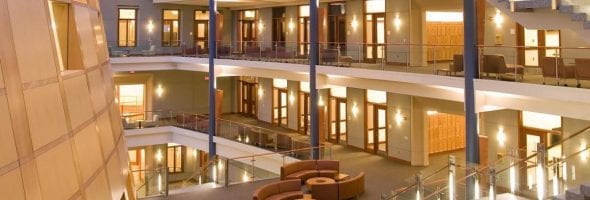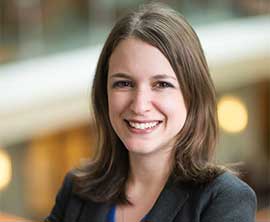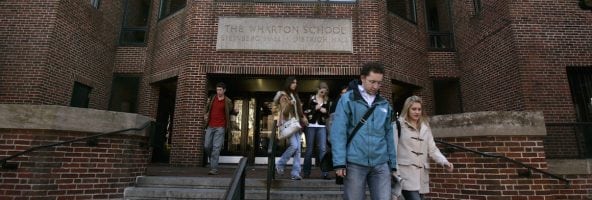Georgetown McDonough MBA Admissions Answers 5 Questions

In our latest installment of the MetroMBA “5 Questions” series, we speak with Shelly Heinrich, Associate Dean, MBA Admissions and Director of Marketing at Georgetown University’s McDonough School of Business. She was kind enough to respond to our questions and share insight into what it’s like to attend McDonough for an MBA.
1. How does Georgetown McDonough help MBA students pursue their special interests?

Shelly Heinrich, Associate Dean, MBA Admissions and Director of Marketing
“One of the reasons Georgetown McDonough stands out is because our students have diverse industry interest areas. We are not a school that places half in consulting and half in finance. While these certainly are the largest areas our students pursue, close to 53 percent are seeking careers in the following industries: technology, consumer products, healthcare, hospitality, manufacturing, nonprofit/social impact, real estate, and government. Technology, in particular, is our third highest career placement industry.
Another way students can pursue special interests is with our customizable curriculum. After students in our full-time and Flex MBA complete their core, they can choose from over 100 electives and don’t have to declare a concentration. We believe this is key because every job requires people to wear multiple hats and have multiple skill sets. So, if we were a school that forced students into certain classes, they wouldn’t be able to build a skill set that addresses the multiple knowledge gaps they are seeking to fill.
Additionally, MBA students can leverage the rest of Georgetown University, taking up to 12 credit hours of electives at another Georgetown graduate program or even 6 of those 12 credit hours at partner institutions in the DC metro area.”
2. What makes Georgetown McDonough a special place for you?

Overlooking the Washington Monument, located just one mile away from the Georgetown University McDonough School of Business campus.
“I experienced what makes Georgetown McDonough special even prior to starting to work here over four years ago. I’ve been living in the DC area for over ten years now and have worked at four other business schools. Throughout my professional and personal life, anytime I engaged with someone who worked, taught, or went to school at Georgetown McDonough, their eyes lit up or ‘sparked’ when talking about their experience. They spoke about their time as if they wanted to be back on campus, reliving their experience. When I received the offer to work here, a former staff member of McDonough reached out to me with congratulations and encouragement and said, ‘I loved my time there. It’s such a special place, and you’re going to love it.’
From day one, I have understood the spark. We have a phenomenal community. Students are high caliber, love their community, and embody the Jesuit values of men and women in service to others. Faculty and staff are committed to the continued growth of the program, and the evidence of this is our continued rise in rankings, the profiles of our incoming students, and our employment results. Also, our alumni are committed to giving back and helping fellow Hoyas.
Four years later, I still love coming to work every day. The buzz and energy of the Hariri building is invigorating and I am always excited to celebrate the weekly or even daily accomplishments of our community.”
3. What does your ideal MBA candidate look like?
“Our ideal candidate has executive presence, grit, diverse personal and professional life experiences, a global mindset, and a generosity of spirit. We want students who will come to Georgetown McDonough and leave a mark, finding their niche in the student community and leaving a legacy that will be experienced by future cohorts and classes.
But, to answer the question that your readers are likely looking for, we certainly look for students with a class profile similar to our recent incoming class. These are students with a strong academic background, professional and personal experiences that can add value to the classroom conversation, and a strong commitment to understanding and appreciating a diverse classroom experience. Our incoming Full-time and Evening MBA class represented over 40 countries and 17 industry backgrounds. The ideal candidate comes in wanting to learn from all the various backgrounds of students.”
4. Are there any new program, centers, faculty members, or events you can talk about?
“The Flex MBA program—the next evolution of our Evening MBA—will start in fall 2019. This program retains the strong assets of our highly ranked part-time MBA program while infusing newly added areas of flexibility.
We will retain an identical curriculum and degree as our full-time MBA and access to the same cohort format. The new aspects of the program include a Saturday elective and hybrid elective options, in addition to the current evening elective offerings. Hybrid electives allow for a mix of on-campus and virtual sessions to provide flexibility to students who may travel for work or who need options to commute less to campus. Additionally, there will be additional opportunities to take our Intensive Learning Experiences, which are 1-2 week intense electives where you complete an entire elective on a host of special topics in a condensed amount of time. Finally, we’re now allowing students to transfer electives of graduate coursework if they have not been counted toward another graduate degree.
We’ve seen strong interest in this program and look forward to the inaugural cohort next fall.
We recently launched a new Certificate in Consumer Analytics and Insights that provides students the opportunity to understand how consumers make decisions via the analysis of consumer data. For students wanting to hone their analytic skills, this is a very relevant certificate. Additionally, the HoyAlytics, student data analytics club is celebrating its one-year anniversary and has provided students with workshops in such programs as Tableau, R, SAS, and Excel.
Working with others across the university, Georgetown McDonough has launched a program to transform the lives of a highly select group of District residents released from local correctional facilities who show strong potential to become successful leaders and role models in their communities.
Through a combination of education and partnership with local employers, the university’s new Pivot Program aims to prepare participants for positions as both entrepreneurial leaders and productive employees.
The Pivot Program represents a collaboration among Georgetown’s Prisons and Justice Initiative, Georgetown College, and the McDonough School of Business, with the support from the Mayor’s Office on Returning Citizen Affairs and a $400,000 grant from the U.S. Department of Commerce’s Minority Business Development agency. In addition, the D.C. Department of Employment Services will provide stipends to our participants.
Georgetown designed the Pivot Program to break that cycle and recapture this untapped human capital. This transition program offers a non-credit-bearing certificate in business and entrepreneurship designed specifically for a cohort of up to 20 returning citizens, to be known as Pivot Fellows.”
5. What’s your favorite DC parade/event that every student should attend?

“I love the Embassy Open House Weekends in May; there are usually two consecutive weekends. Most embassies open their doors for a weekend of food, dancing, and cultural activities specific to their country. You can walk from embassy to embassy for an entire day of cultural immersion. It is something unique to D.C. that you wouldn’t get anywhere in the world. We have over 177 embassies in D.C. which is representative of what a global city we are.
Additionally, every student has to watch the 4th of July fireworks on the National Mall at least once while here. It is truly an U.S. American tradition and patriotic experience. Hot dogs, music, blankets, picnic baskets, and red, white, and blue.”
Wharton School Receives Largest-Ever Gift: $50 Million to Go Toward Faculty

Marc J. Rowan (W’84 & WG’85) and Carolyn Rowan recently gifted $50 million to The Wharton School, the largest-ever single gift to the business school. The generous Wharton donation will be used to help attract new world-class faculty, appoint new Rowan Fellows, and support the Penn Wharton Budget Model (PWBM), a groundbreaking economic policy analysis program.
“With profound gratitude to Marc and Carolyn Rowan, I anticipate the tremendous impact of their philanthropy on the University of Pennsylvania,” Penn President Amy Gutmann says in a university press release. “Their investment in Penn’s future will strengthen our intellectual resources, provide our students with life-changing mentors, and mobilize our knowledge for the advancement of society.”
Wharton Donation For Faculty
A good portion of the $50 million will be used to enhance faculty at the Wharton School. The goal is to help Wharton compete for the most talented business school professors in a highly competitive market. Specifically, the gift will be used to enhance Wharton’s ability to address complex global challenges through research and teaching.
Specifically, the $50 million will go toward faculty recruitment and betterment in two ways:
- Wharton will recruit three new Rowan Distinguished Professors. These individuals are leaders in their field and will help connect academia and business.
- The gift will also help the School appoint a select number of Rowan Fellows. These individuals will serve five-year terms and will receive support for the innovative research and teaching.
In a press release, Marc Rowan spoke about the gift’s impact on faculty, saying, “Carolyn and I are honored to join the vision of the Wharton community to bring the School’s outstanding students face to face with the most important thinkers of our time,” Rowan says. “As top Wharton researchers advance and shape their fields, they transform the lives of their students, preparing them to make a difference in the business world and beyond.”
Penn Wharton Budget Model
The gift enhances the Penn Wharton Budget Model (PWBM); a nonpartisan, research-based initiative that provides accurate, accessible, and transparent economic analysis of public policy. The project uses research briefs as well as interactive budget tools to analyze legislation. PWBM works directly with policymakers to provide the most effective insight on policy changes on Capitol Hill.
More Than Ever Fundraising Campaign
The gift comes to the school as part of the More Than Ever fundraising campaign, of which Rowan is the co-chair. The campaign started with a goal of raising $850 million. However, in part thanks to the latest gift, the goal is now $1 billion.
The More Than Ever campaign launched earlier this year with the goal of helping Wharton become synonymous with innovation, analytical decision making, entrepreneurship, and global leadership. The fundraising will go toward two flagship capital projects:
- A state-of-art academic building, which will stand beside Steinberg Hall-Dietrich Hall and the Mack Pavilion. This building will bring together Wharton’s cutting-edge research in business analytics, innovative learning, and teaching spaces.
- A new Venture Lab, which helps Penn students interested in launching new startups.
The gift from Rowan provides an excellent start for all initiatives.

Marc J. Rowan, Wharton W’84 & WG’85
“I am deeply grateful for Marc and Carolyn’s extraordinary gift, which reflects their passion to bring to Wharton the most innovative researchers working on the world’s most pressing and important questions,” Wharton Dean Geoffrey Garrett says. “Their commitment is the cornerstone of a campaign that will empower Wharton, more than ever, to create leaders who will change the world.”
Marc J. Rowan
Rowan is the Co-Founder and Senior Managing Director of Apollo Global Management, a private equity firm with $247 billion in investor commitments. The firm is a leading alternative asset manager with focus on private equity, credit-oriented capital markets, real estate, and insurance investments.
Beyond his work at Apollo, Rowan is an active member of the Wharton community. He graduated Summa Cum Laude from the school with a BS and an MBA in finance. Then, since 1994, he’s been contributing to Wharton’s success in a variety of ways.
Through philanthropy, Rowan has supported both undergraduate and MBA aspects of Wharton. He has contributed to financial aid, faculty, the Dean’s fund, capital projects, Wharton Customer Analytics, The Wharton Fund, the football program, the Institute for Contemporary Art, and more. Rowan is also the chair of Wharton’s Board of Overseers as well as being a Penn trustee.
To read more about the Wharton donation, check out the original press release at Wharton News.
Finding the Best Real Estate MBAs in Los Angeles

Over the past few years, MBA programs and courses in real estate have seen continued growth, as both interest and need have become undeniable throughout the country. With property values and real estate often having a tremendous impact on the overall economic health of the nation, educating and placing top talent in this sector can be vital. But how can you turn a valuable MBA into a lucrative career in Los Angeles real estate?
Although a business focus on real estate is nothing new, the idea of MBAs concentrating in the industry as part of their degree has been getting increasingly more popular. It is somewhat difficult to find MBA programs that offer specializations in the field, even though 2017 saw more than $5 billion invested into real estate technology—a massive increase since the Great Recession. Startups like Airbnb and WeWork area also changing the way the real estate industry overlaps with entrepreneurship and technology, making it even more important for a workforce of talented individuals helping to guide the industry going forward.
Los Angeles, long at the center of discussions about urban development and city planning, features some of the country’s most vital real estate business program. Take a look at the three of the best Los Angeles real estate MBA programs below.
Marshall School of Business – USC
USC’s Marshall School of Business allows students in the full-time MBA program specialize their degree in real estate through electives that focus on topics like investment, finance, valuation, law, development, and the economics of real estate markets. This degree will prepare students for a variety of careers in the Los Angeles real estate field, pairing a focus on the unique aspects of the real estate field with the acknowledgement that success in the real estate field relies still relies on fundamentals like management, marketing, strategic planning, and economics.
The USC MBA in real estate is unique in the student’s ability to tailor the curriculum to their own career and educational needs, acknowledging the wide variety of roles within Los Angeles real estate, such as investment and asset management, consulting, valuation, asset management, and more.
Below are just a few Graduate Real Estate courses offered for MBA students at Marshall:
- Mortgage-Backed Securities and Markets. This course, which includes lectures, assignments and a project, looks at residential and commercial mortgages as well as mortgage-backed securities and markets.
- Urban Land Use-Feasibility Studies. This course consists of a team field study analysis of a prospective development site. Students will work together with a client to address issues like design, entity choice, deal structure, land use, economic analysis, and allows teams to interact with industry professionals throughout the process of developing their proposals.
- Real Estate Finance and Investment. This course consists of both cases and lectures, as well as assignments and exams to evaluate student’s understanding of valuation, projects, financing, and investment analysis. Students will also learn to use ARGUS 7.0, one of the top real estate investment software packages used throughout the industry.
Anderson School of Management – UCLA
The real estate MBA focus at UCLA’s Anderson School of Management has consistently been named among the best real estate programs in the country, let alone Los Angeles. The real estate concentration at Anderson trains students to join the industry through a strong education in real estate financing, investing, and entrepreneurial development. The concentration is integrated into the school’s overall MBA program, with the option for many real estate-centered electives, providing both theoretical and practical study in the most important aspects of the industry.
YOU MAY ALSO LIKE: The Top 5 Schools for an MBA in Real Estate
The Anderson School of Management also recognizes that real estate is not just a matter of business, and encourages MBA students to seek classes in other departments at UCLA, including public policy, urban planning, architecture, engineering, taxation, and law.
Below are some popular electives available to Real Estate MBA students at Anderson:
- Urban Real Estate Financing and Investment. This course helps students to bridge the gap between theory and practice in real estate finance and investment, training students to use finance and economics to uncover insights about real estate markets and investments.
- Entrepreneurial Real Estate Development. This course looks at real estate through the lens of entrepreneurship, helping students identify market opportunity, product definition, and conceptual feasibility through work in an entrepreneurial environment.
- Public Policy Clinic: Land Use, the Environment and Local Government. Acknowledging the interdisciplinary nature of this field, this course will provide students with a solid education in the complicated connections between land use control, state and local government law, and environmental quality
The Paul Merage School of Business – University of California, Irvine
At the Merage School of Business‘ Center for Real Estate, students can earn an MBA Certificate in Real Estate and Urban Development, with a curriculum just as dynamic and diverse as the marketplace itself. The MBA certificate presents students with a holistic approach to real estate, using lessons from past trends and cycles within the industry to help students prepare for a career in this often volatile industry.
Students who have at least two years of study in a Merage MBA program are eligible to pursue this certificate after successful completion of certain prerequisites in real estate. After completing these courses, students can choose from a number of electives connected to the certificate, such as:
- Real Estate Capital Markets
- The Real Estate Development Process
- International Real Estate
- Applied Real Estate Security Analysis and Portfolio Management
- Practicum in Mixed-Use Community Development
The MBA Real Estate Boom: Inside The Schulich Real Estate Program

Real estate is booming. In fact, according to the Financial Times, commercial property asset values and investment yields have surpassed levels prior to the Great Recession, and there is continued strong demand for offices, urban apartments, and more. It’s all thanks to continued low interest rates and tight supply.
What has this real estate boom meant for business schools? It’s meant a decrease in interest in banking and an increase in interest for real estate study, particularly among MBA students who understand the cycle and want to get involved while they can. The reality is that there are many jobs in real estate, and that’s what MBA students want.
According to Sherena Hussain, an assistant professor in Infrastructure at the York University Schulich School of Business, “The real estate and infrastructure sectors account for a large proportion of a nation’s GDP.” So, it shouldn’t be surprising that many top MBA programs are prioritizing real estate curriculum, specializations, and clubs for their students.
Real Estate and Infrastructure at the Schulich School
Real estate and infrastructure have an indispensable role at the Schulich School. Not only does the school offer a Master of Real Estate and Infrastructure (REI), but MBA students can also specialize their curriculum with a focus on REI. The MBA specialization focuses on “creating and maintaining places for living, working, shopping, learning, recreation and culture, and the critical accompanying support systems ranging from mobility and logistical networks, to utilities and energy supply,” according to the school website.
One of the reasons behind the MBA REI specialization at Schulich is Toronto itself.
“Many of the leading global Real Estate and Infrastructure firms are located in Toronto,” explains Hussain. “If you are interested in a career in real estate and infrastructure, Schulich’s MBA specialization is a rare opportunity to develop your understanding, skills, and network in a way that leverages the specialization’s top-tier reputation and committed faculty and alumni base.”
As part of the REI specialization, students must complete 12 credits focused on real estate including two required courses: Real Estate Finance & Investment and Development Prototypes. Other potential courses include:
- Partnership Models for Infrastructure Delivery
- Structuring Real Estate Transactions
- Commercial Real Estate Asset Management
“The idea behind the REI MBA specialization is to bring students to industry and industry into the classroom,” Hussain outlined in an email exchange with MetroMBA.
“Our faculty and sessional instructors have real-world experience and bring this perspective into the classroom by leveraging experiential learning at its finest. Examples include flying in senior policy officials to judge a capstone assignment about international infrastructure, bringing leading CEOs into the classroom as guest speakers in REI investment classes, or partnering with a leading national-law firm to have our students learn how to negotiate joint venture agreements. This is a small sample of how the REI MBA specialization approaches holistic learning.”
But holistic learning isn’t just regulated to the MBA program and inside classrooms. It can be found throughout the school, including within Schulich’s Real Estate and Infrastructure Club (SREIC).
Schulich Real Estate and Infrastructure Club
SREIC is open to all Schulich business students interested in learning more about pursuing a career in real estate and infrastructure. The club acts as a liaison between students, the industry, and professionals.
“SREIC offers MBA students an opportunity to supplement their learning with real-world, co-curricular programming and unique networking opportunities,” says Hussain. “It’s a student-run group that has the full backing of Schulich’s Real Estate and Infrastructure program faculty, and it is one of the most active student groups at the business school.”
Programming offered by the club includes:
- Value-Oriented Programming: site visits, breakfast seminars, conference engagements, project panels, case competitions, etc.
- Deep Industry and Alumni Relations: on a one-on-one and broad basis through speed mentoring, recruitment breakfasts, and keynote events.
- Leadership Development Opportunities: including the semi-annual resume book circulated to recruiters and senior leaders.
There are also several keynote events that take place each year including Schulich’s Developers’ Den international case competition, ARGUS training, and Schulich’s annual Perspectives Lecture. And one event that just took place in February was the annual New York City real estate study tour.
The study tour is part of a partnership with Columbia University’s real estate program, beginning several years ago. It’s a three-day intensive and transformative real estate experience that takes students to site visits and tours of leading real estate and infrastructure firms all over NYC. Some of those firms include Blackstone, Related Companies, Oxford, Vornado Realty, WSP, Brookfield, and Silverstein Properties. The goal is to give students a glimpse into the future of real estate
“Schulich students benefit from learning more about a new market, as well as having a basis for global comparative learning,” Hussain explains. “The partnership [with Columbia] offers an opportunity to develop a network of peers engaged in commercial real estate development in New York City and across the U.S. Each year, the club visits a development class held at Columbia University to learn more about their approaches to learning about real estate. In return, the Schulich School hosts an annual friendship dinner in Manhattan to offer more opportunities for students, alumni, and friends of industry from Canada and the U.S. to forge relationships.”
The trek is a unique event that gives Schulich students a chance to explore real estate and infrastructure in a whole new way.
“The 2018 SREIC New York trip was an excellent and well-balanced learning experience for students who are truly passionate about real estate and infrastructure,” says James Chang, an MBA student working to his REI specialization. “A prime example of ‘outside the classroom’ learning with the perfect balance between education, relationship building, and fun. I would highly recommend it to students in the MREI or MBA program to take advantage of this opportunity next year!”
To learn more about real estate and infrastructure at the Schulich School of Business, visit the school’s website.
Berkeley Haas Professor Sees the End of the “Easy Money” Era in U.S.

On the eve of the new House Tax Cuts and Jobs Act being passed by the U.S. Senate, Haas School of Business professor and Fisher Center for Real Estate & Urban Economics chairman Ken Rosen projected a slow end to the era of easy money, typified by “artificially” low interest rates and increased rates of home ownership, and a Bitcoin bubble, post-GOP tax plan. Don’t worry; you’ve still got time to get your ducks in a row.
Last month’s 40th Annual Real Estate & Economics Symposium was the site of Rosen’s annual economic forecast, titled “Peak Moment or Extra Innings?” While Rosen doesn’t foresee another recession on the horizon, he posited that the 9-year asset bubble that developed as a result of low interest rates “will come to an end when rates are normalized” in a couple more years.
When it comes to real estate, Rosen says industrial spaces are the hot ticket these days, due in no small part to the efforts of certain e-commerce titans—in fact, Amazon is credited with 60 percent of new warehouse construction. “Industrial is the new retail. There’s a big restructuring happening. Cannibalization is what we call it, and the cannibal lives in Seattle,” Rosen says.
Rosen says the new tax overhaul is expected to hit homeowners in California especially hard. “[The bill contains] a number of provisions that will hurt housing, including the property tax deduction limitation and limitations on mortgage interest deductions.”
The impacts of the bill extend to the larger California state economy, which is expected to take a “$38 billion bite from taxpayers if the state and local income tax deduction is eliminated.” Rosen explains that California will become “more tax disadvantaged relative to other states” as a result of the GOP plan and will accelerate “out-migration from California.”
What Are The Differences Between The World’s Best Online MBA Programs?

Every year, the online MBA becomes an increasingly more attractive option for business school students. With the flexibility to pursue your degree at your own pace and the chance to choose the best MBA program for you without considering location, prospective MBAs can truly make the most of their degree. And though some may be worried about missing out on a traditional classroom experience and the community that comes with it, changing educational technology has made it easier than ever for students to play an important part in their school’s community—without getting out of your pajamas.
The new MetroMBA Online Metro has rounded up some of the best online MBA programs available to students. To help determine which program fits your needs, we take a look at what sets each program apart—and what might just make it the perfect MBA for you.
Fox School of Business — Temple University
The Online MBA Program at Temple University’s Fox School of Business has the distinction of being ranked as the best online MBA in the country, and the best online MBA for veterans, according to U.S. News & World Report. The Online MBA at Fox offers total flexibility for students, with the opportunity to complete the degree within anywhere from 20 months to six years. To help students feel connected with the Fox community, the program offers weekly live web conferencing sessions allowing students to stay connected to faculty and classmates, as well as providing one-and-one career coaching.
The Online MBA at Fox is structured around three required courses that help prepare students for the program, 36 credits that can be completed at the student’s own pace, and a final consulting capstone course that offers total business immersion. The Fox MBA has also been recognized for its benefits for frequent travelers or military members. About 17 percent of students in the most recent class had some form of military experience.
The Fox Online MBA offers a number of areas of study, ranging from HR Management, International Business, Real Estate, Statistical Science, and much more. After completing the program, students on average saw a $30,000-plus salary increase and a median salary of $105,000 three years after graduation.
Hough Graduate School of Business — University of Florida
Although online MBAs tend to be on the rise in recent years, the Hough Graduate School of Business was one of the first business schools to offer a fully accredited online degree—almost twenty years ago. Today, the Financial Times and U.S. News & World Report consistently rank the Hough Online MBA among the top programs in the country.
The Hough Online MBA is the perfect opportunity for students that travel extensively, may move while pursuing their degree, or have a number of weekend commitments. To ensure that students still get face-to-face time with the school’s faculty and classmates, students return to campus once every four months for periodic residencies, allowing them to stay in touch with the community.
The online degree at Hough can be completed in either a two-year or one-year format. Both degrees give students the chance to choose among four areas of focus for their degree: entrepreneurship, finance, marketing, and international. The Hough Online MBA may also be perfect for students looking to immerse themselves in a global business education, as it offers students the chance at a Global Immersion Experience. Students have recently traveled to areas such as Argentina, United Arab Emirates, China, and Ireland.
Kelley School of Business — Indiana University
The Online MBA at the Indiana University Kelley School of Business is made up of 51 credit hours, 39 of which are required courses. The remaining credits can be used towards electives that will help students narrow the focus of their degree in an area such as Business law and ethics, economics, marketing, project management, operations, and more.
Each quarter, Kelley also offers an AGILE course—Accelerating Global Immersion Leadership Education—which frequently partner with top business schools around the globe. Students have recently traveled to such areas as India, Myanmar, South Africa, Botswana and Brazil.
The Kelley Online MBA also stands out because it offers students the chance to earn a dual degree online, pairing their MBA with an online MS in Business Analytics, Global Supply Chain Management, Marketing, Strategic Management, or Entrepreneurship & Innovation.
CHECK THIS OUT: No GMAT, No Problem
Kenan-Flagler Business School — University of North Carolina
The Online MBA at the UNC Kenan-Flagler Business School, better known as the MBA@UNC, may take students anywhere from 18 to 36 months to complete and include nine core courses in foundational business fields, such as economics, introductory finance, business strategy, operations management, and more. Students may also choose from over 30 electives to focus their degree in a particular concentration such as entrepreneurship or management consulting.
The MBA@UNC also requires students to complete two in-person immersions, which may be completed domestically or—for students interested in global business—internationally. Through the Student Teams Achieving Results (STAR) and Doing Business In (DBI) program, students also have the chance to study abroad at an MBA exchange partner school.
The MBA@UNC stands out thanks to its many post-graduate resources thanks to the Career & Leadership team. Replacing traditional on-campus recruiting, a Virtual Company Information Sessions allow executives from a variety of industries throughout the country to communicate with students about the hiring needs of their companies. Alumni can access these resources at any point after their graduation and can also take additional MBA courses as needed for their career development.
Tepper School of Business — Carnegie Mellon University
Carnegie Mellon’s Tepper School of Business offers students a flexible online degree that is completed through a combination of online and on-site experiences throughout a 32 month period. Each week, students will have access to a 70-minute online course that allows them to virtually interact in real time. Throughout the year, they will also be required to attend six “Access Weekends,” held at the university’s various locations throughout the country. The Tepper Online MBA may be the program that provides the most opportunities for in-person contact with classmates and faculty, so students that are interested in more face time as part of their online program may be particularly interested in this degree.
Tepper students are provided with in-depth career coaching and recruitment opportunities. Students will also visit a number of major companies in the country, such as Google, Amazon, JP Morgan, and Microsoft. Within just three months of graduation, roughly 91 percent of students in the Tepper Online MBA program were offered a full-time role.
W.P. Carey School of Business — Arizona State University
The Arizona State University’s Carey School of Business online MBA degree is structured around just one course at a time, each five weeks long. Students are immersed in an inclusive online environment that allows them to interact with classmates through case-based projects.
Carey, in comparison to several other schools noted on this list, is also unique in its option of pursuing a concurrent online degree, such as a Master of Legal Studies, MSE in Electrical Engineering, or MS in Industrial Engineering.
